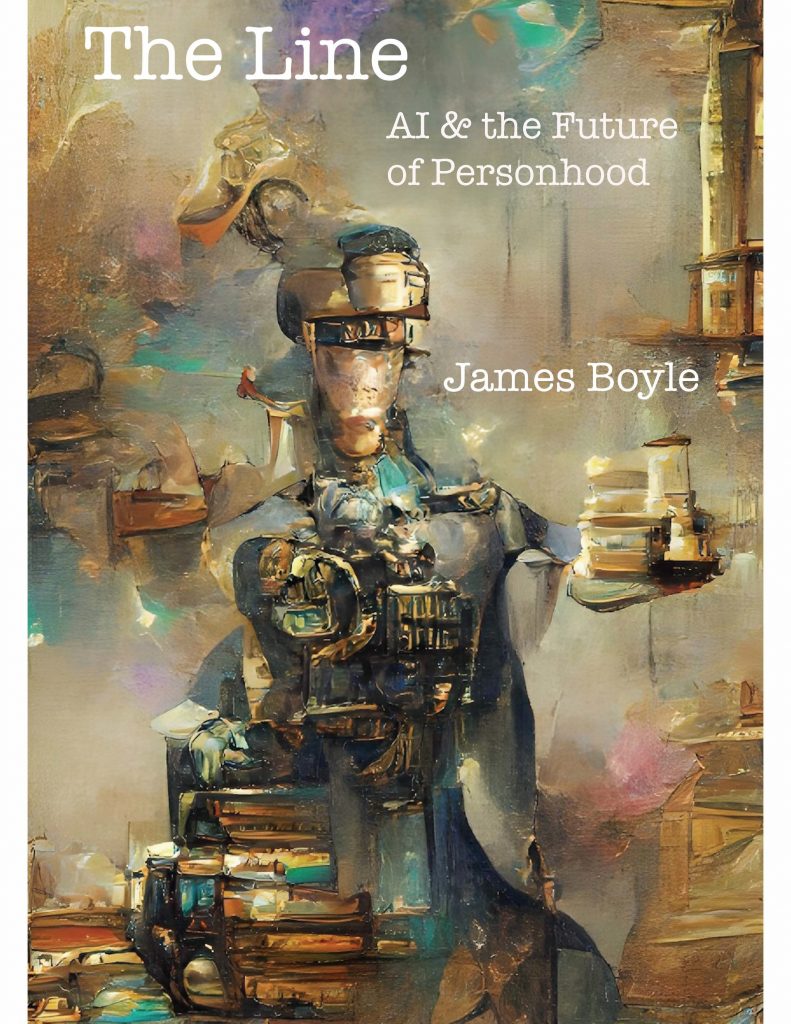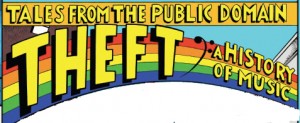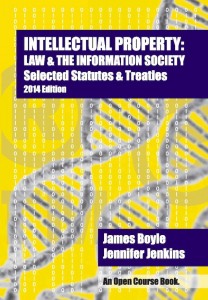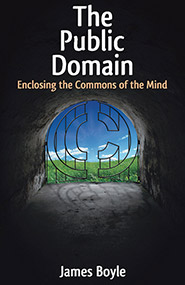The Brookings Institution has organized a volume on “The Future of the Constitution” edited by Jeff Rosen and Benjamin Wittes and featuring articles by me, Larry Lessig, Jonathan Zittrain, Tim Wu and many others. How will our constitutional tradition deal with the challenges posed by new technologies? The topics range from possible personhood claims by artificial intelligences, to the future of free speech and the Net, to neuroscience and criminal punishment. The essays are freely available online. Details after the jump.
The Future of the Constitution Series
Technological changes are posing stark challenges to our constitutional values. From free speech to privacy and from liberty and personal autonomy to the right against self-incrimination, basic constitutional principles are under stress from technological advances. The Future of the Constitution Series presents an invaluable roadmap for responding to the challenge of adapting our constitutional values from future technological developments.
Endowed by Their Creator?: The Future of Constitutional Personhood
March 09, 2011
 In the coming century, it is overwhelmingly likely that constitutional law will have to classify artificially created entities that have some but not all of the attributes we associate with human beings, writes James Boyle. In this Future of the Constitution series paper, Boyle examines the jurisprudential challenges and how constitutional law should and will meet them.
In the coming century, it is overwhelmingly likely that constitutional law will have to classify artificially created entities that have some but not all of the attributes we associate with human beings, writes James Boyle. In this Future of the Constitution series paper, Boyle examines the jurisprudential challenges and how constitutional law should and will meet them.
Neuroscience and the Future of Personhood and Responsibility
February 03, 2011
 With advances in neuroscience technology, functional imaging and genetic evidence may be introduced more often in criminal cases outside of capital sentencing proceedings, writes Stephen Morse. As a result, it is worth considering in detail neuroscience’s radical challenge to responsibility, which treats people as “victims of neuronal circumstances” or the like. If this view of personhood is correct, say Morse, it would indeed undermine all ordinary conceptions of responsibility and even the coherence of law itself.
With advances in neuroscience technology, functional imaging and genetic evidence may be introduced more often in criminal cases outside of capital sentencing proceedings, writes Stephen Morse. As a result, it is worth considering in detail neuroscience’s radical challenge to responsibility, which treats people as “victims of neuronal circumstances” or the like. If this view of personhood is correct, say Morse, it would indeed undermine all ordinary conceptions of responsibility and even the coherence of law itself.
A Mutual Aid Treaty for the Internet
January 27, 2011
 Today, most people have direct access to the Web, but now their online lives are described by consolidating search engines, content providers, and social networking sites. However, with greater online centralization comes greater vulnerability, writes Jonathan Zittrain. The key to solving this is to make the current decentralized Web a more robust one by reforging the technological relationships sites and services have with each other on the Web, drawing conceptually from mutual aid treaties among states in the real world.
Today, most people have direct access to the Web, but now their online lives are described by consolidating search engines, content providers, and social networking sites. However, with greater online centralization comes greater vulnerability, writes Jonathan Zittrain. The key to solving this is to make the current decentralized Web a more robust one by reforging the technological relationships sites and services have with each other on the Web, drawing conceptually from mutual aid treaties among states in the real world.
Reproductive Rights and Reproductive Technology in 2030
January 21, 2011
 In a futuristic setting, John Robertson examines the legal challenges facing the constitutional doctrine of procreative liberty. Robertson writes that by 2030, the logic of procreative freedom should recognize the right of prospective parents to use the technologies available to have the family that they choose.
In a futuristic setting, John Robertson examines the legal challenges facing the constitutional doctrine of procreative liberty. Robertson writes that by 2030, the logic of procreative freedom should recognize the right of prospective parents to use the technologies available to have the family that they choose.
Cognitive Neuroscience and the Future of Punishment
December 28, 2010
 Advances in cognitive neuroscience have breathed new life into very old arguments about human agency, moral responsibility, and the proper ends of criminal punishment. O. Carter Snead examines the cognitive neuroscience project and explores the radical conceptual challenge that it poses for criminal punishment in the United States.
Advances in cognitive neuroscience have breathed new life into very old arguments about human agency, moral responsibility, and the proper ends of criminal punishment. O. Carter Snead examines the cognitive neuroscience project and explores the radical conceptual challenge that it poses for criminal punishment in the United States.
Is Filtering Censorship? The Second Free Speech Tradition
December 27, 2010
 According to Tim Wu, anyone who wants to understand free speech in America in the 21st Century needs to needs to know how the concept has expanded over time. A second tradition, dating from 1910 or the 1940s, goes beyond free speech as defined by the First Amendment, as it takes into account the actions of concentrated, private intermediaries who control the technology of mass communications.
According to Tim Wu, anyone who wants to understand free speech in America in the 21st Century needs to needs to know how the concept has expanded over time. A second tradition, dating from 1910 or the 1940s, goes beyond free speech as defined by the First Amendment, as it takes into account the actions of concentrated, private intermediaries who control the technology of mass communications.
Translating and Transforming the Future
December 17, 2010
 Predicting the future in constitutional law is so difficult because of constitutional interpretation, writes Lawrence Lessig. Constitutional meaning comes just as much from what everyone knows is true (both then and now) as from what the Framers actually wrote. Yet “what everyone knows is true” changes over time, and in ways that it is impossible to predict, even if quite possible to affect.
Predicting the future in constitutional law is so difficult because of constitutional interpretation, writes Lawrence Lessig. Constitutional meaning comes just as much from what everyone knows is true (both then and now) as from what the Framers actually wrote. Yet “what everyone knows is true” changes over time, and in ways that it is impossible to predict, even if quite possible to affect.
The Cyberthreat, Government Network Operations, and the Fourth Amendment
December 08, 2010
 To meet the threat of a cyber attack, Jack Goldsmith imagines that sometime in the near future the government mandates the use of a government-coordinated intrusion-prevention system throughout the domestic network to monitor all communications, including private ones. Although such a program would be controversial, Goldsmith argues that massive government snooping in the network can be lawful and deemed consistent with the U.S. Constitution, including the Fourth Amendment, if proper and credible safeguards are put in place.
To meet the threat of a cyber attack, Jack Goldsmith imagines that sometime in the near future the government mandates the use of a government-coordinated intrusion-prevention system throughout the domestic network to monitor all communications, including private ones. Although such a program would be controversial, Goldsmith argues that massive government snooping in the network can be lawful and deemed consistent with the U.S. Constitution, including the Fourth Amendment, if proper and credible safeguards are put in place.
Is the Fourth Amendment Relevant in a Technological Age?
December 08, 2010
 To date, the Supreme Court’s interpretation of the Fourth Amendment has both failed to anticipate and continued to ignore virtual searches or investigative techniques that do not require physical access to premises, people, papers or effects and that can often be carried out covertly from far away, thereby undermining citizen protections, writes Christopher Slobogin.
To date, the Supreme Court’s interpretation of the Fourth Amendment has both failed to anticipate and continued to ignore virtual searches or investigative techniques that do not require physical access to premises, people, papers or effects and that can often be carried out covertly from far away, thereby undermining citizen protections, writes Christopher Slobogin.
Innovation’s Darker Future: Biosecurity, Technologies of Mass Empowerment, and the Constitution
December 08, 2010
 Ben Wittes argues that in coming years, biothreats—especially those emanating not from governments but from individuals—present perhaps the most profound challenge to the Constitution and the nation’s most basic assumptions with respect to security. Wittes examines the continued proliferation of bioterrorism technologies and how that will lead to a significant erosion of the federal government’s monopoly over security policy, and the consequences of that erosion.
Ben Wittes argues that in coming years, biothreats—especially those emanating not from governments but from individuals—present perhaps the most profound challenge to the Constitution and the nation’s most basic assumptions with respect to security. Wittes examines the continued proliferation of bioterrorism technologies and how that will lead to a significant erosion of the federal government’s monopoly over security policy, and the consequences of that erosion.








